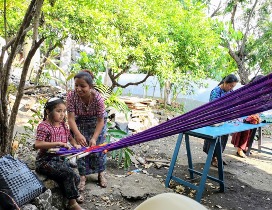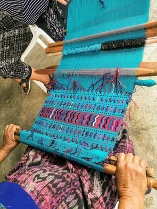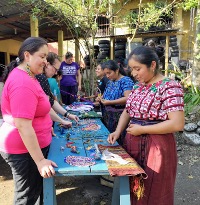Once we were settled in Quixaya, a community in the highlands of Guatemala, we had the privilege of spending an afternoon with various groups of women who are trying to become entrepreneurs by creating a blend of traditional and fashion articles to sell and such gain economic empowerment.
Historically these designs and skills were passed through generations as a way to carry on the local culture and keep family traditions alive. It is unfortunate that young girls are pressured to learn  these skills as a way to create income for their family but it is also fulfilling that these women have a unique and empowering way to incorporate family tradition into a new entrepreneurial vision.
these skills as a way to create income for their family but it is also fulfilling that these women have a unique and empowering way to incorporate family tradition into a new entrepreneurial vision.
One group of women were weavers. They create blankets, baby carriers, shawls and traditional clothing with a fashion twist. We were able to watch some of the women and girls weave and see the amazing work that goes into these pieces. A 7-year old girl was there with her grandma who was teaching her how to weave. These women had items we were able to purchase and it was amazing to see these women describe and sell their items, they even encouraged the young girl to sell her own items and her face lit up when she made her first sale.
her grandma who was teaching her how to weave. These women had items we were able to purchase and it was amazing to see these women describe and sell their items, they even encouraged the young girl to sell her own items and her face lit up when she made her first sale.
Another group of women made beadwork items. These young women have taken to making broaches, hair pieces, jewelry and keychains. It was amazing to see these women step out of their comfort zone and feel proud to sell their items.
The last group of women we did an exchange with were part of a new project the CCDA is pursuing as part of their mission of increasing rural women’s empowerment. The new project is called “Cut and Create” and we got to hear that the next phase of their collective is to purchase several industrial sewing machines, material and clothing patters so that they can create bags, shirts and pants in larger quantity. Once the items are made, they will incorporate hand beading and stitching to bring a traditional aspect to the items. Once the project is fully developed, they hope to open stores to facilitate the women selling their items.
As joyful as it was to see these women stepping out of their homes and becoming part of their family income it was also difficult to hear their stories. What should  be enjoyment and tradition has become a need, the young girls need to learn early so they can contribute to the family, they need to produce as many items as they can. It was also tough to see how little they sell their items for when it takes so much time to produce. This is an unfortunate reality for anyone who makes handmade items, you just cannot compete with facilities that mass produce. My heart goes out to these women and it made me very thankful that I am in a position where I can enjoy the crafts that I make and do not need to rely on them for income.
be enjoyment and tradition has become a need, the young girls need to learn early so they can contribute to the family, they need to produce as many items as they can. It was also tough to see how little they sell their items for when it takes so much time to produce. This is an unfortunate reality for anyone who makes handmade items, you just cannot compete with facilities that mass produce. My heart goes out to these women and it made me very thankful that I am in a position where I can enjoy the crafts that I make and do not need to rely on them for income.
This was an eye-opening experience for me, I realized how important our social justice commitment is and why it’s so important to continue the work that we do though the PSAC Social Justice Fund. I look forward sharing my experience, encouraging others to participate with Education in Action, and supporting Café Justicia, one of CCDA’s sustainable development project of fair-trade coffee.
by Cheryl Jensen
Cheryl is a member of UNDE Local 30907 and of the District Labour Council based out of Medicine Hat, Alberta.
 Member Login
Member Login


